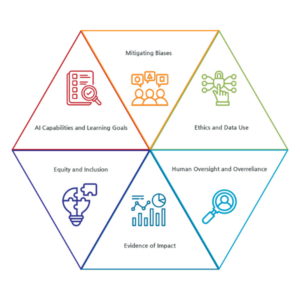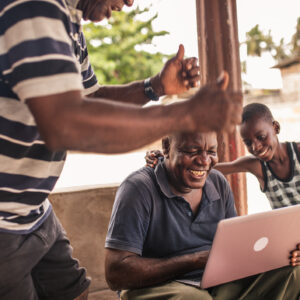
With finalized State Digital Equity Plans due in the fall through early winter, the majority of states have wrapped up their public listening sessions and surveys. Most states are now preparing to share the draft of their plan for public comment over the next few months, and your input will be key.
Adult education leadership continues to be critical in this stage of state planning. Under the Digital Equity Act of 2021 (DEA), states are required to hold a public comment period of at least thirty (30) days, consider all comments received during this public comment period, and incorporate any “worthwhile” comments. It is crucial for adult education leaders, advocates, and learners to participate in public commenting: this may be the last opportunity to ensure that both adult learners and adult education systems are included in State Digital Equity Plans. Once these plans are submitted to the U.S. Department of Commerce’s National Telecommunications and Information Administration (NTIA) for State Capacity Grant funding, states will be responsible for implementing the vision and activities outlined in their plan over the next five years.
In summary, your comments can truly make a difference and help shape the future of digital equity in your state!
What is public commenting?
Public commenting is an opportunity for the general public to provide feedback on proposed governmental rules and regulations. The public comment process is open to everyone, including individuals (i.e., private citizens), organizations, subject matter experts, advocacy groups, and other stakeholders interested in the rule or topic under consideration.
Public commenting ensures transparency, accountability, and inclusivity in rule-making processes. It allows the diverse perspectives of the public to be heard, and provides individuals with lived experience and impacted communities with an avenue to voice their support and concerns. Decision-makers may then make informed choices based on the input received.
Where can I find more information about my state’s Digital Equity Plan?
As of the publication of this blog post, seven states have posted their plans for public comment: Montana, Louisiana, Maine, Utah, Michigan, West Virginia, and Wyoming.
World Education has compiled information about each state’s DEA administering entity, public and stakeholder engagement activities, and Digital Equity Plan and public comment process in our DEA tracking sheet. This document is updated frequently.
In addition, NTIA has published a webpage to house all State Digital Equity Plan drafts. Interested individuals can sign up to receive notifications on the page when there are updates.
What should I look for as I read my state’s Digital Equity Plan?
We encourage everyone to read their State Digital Equity Plan in full. However, you can use the Ctrl+F keyboard shortcut to search for key terms, including “adult education,” “adult literacy,” “individuals with a language barrier,” and “English learners.” The Benton Institute for Broadband & Society is also publishing summaries of each state plan as plans are released.
As you read your state plan, refer to World Education’s State Digital Equity Plan checklist for adult education. The checklist identifies three key areas where adult education providers and adult learners should have been engaged:
- In the development of the State Digital Equity Plan (dark grey), to ensure the inclusion of adult learner voices and adult education expertise;
- In the proposed implementation strategies (teal) listed in the State Digital Equity Plan, to ensure effective services for adult learners and other individuals with a language barrier; and
- During the public comment process (orange), to ensure awareness and accessibility of the State Digital Equity Plan and the public comment process for adult learners and their communities.
The checklist is not meant to be used as a comprehensive evaluation of a State Digital Equity Plan, but rather as a tool to identify opportunities where the adult education field can further support the state’s digital equity efforts.
What should I include in my public comment?
Every state will have different guidelines regarding public commenting, but we suggest referring to our checklist and including the following as a starting point:
- Recognize adult education engagement efforts: Acknowledge the work your state has already done to solicit the expertise and voices of adult learners and the adult education field;
- Advocate for further inclusion of adult education: Offer recommendations on how adult education can be further included in the State Digital Equity Plan, and how adult learners’ needs can be fully identified and addressed;
- Provide feedback on communication and accessibility: Share feedback on the communication and accessibility of any public engagement efforts undertaken during the State Digital Equity Plan development process, including public listening sessions, resident and stakeholder surveys, and the current public comment process.
How can adult learners get involved in public commenting?
Encourage your learners to submit their own comments, whether individually or as part of your organization or program’s collective response. The overwhelming majority of adult learners fall into more than one of the covered populations prioritized under the DEA, and it is their voices and experiences that matter most.
As with any public comment process, individuals submitting comments do not need to be subject matter experts, professionals, or affiliated with any given organization. Learners can focus on the following:
- Their experience with the State’s outreach efforts;
- What impact the proposed implementation strategies will have on their lives, positive and negative;
- How the State’s outreach efforts and proposed implementation strategies might be improved; and
- Their lived experience as people affected by the digital divide.
What will states do with the comments they receive?
In accordance with legislation, when submitting their finalized plan for State Capacity Grant funding, States must 1) describe any changes they made to the plan in response to received comments, and 2) write a response to each comment received.
We commend the months of awareness building and advocacy efforts that adult education leaders and advocates have poured into ensuring the inclusion of our learners and the field in State Digital Equity Plans. As states set their priorities and strategies for closing the digital divide over the next five years, these public comment periods may be the last opportunity to ensure adult education is included in writing. We strongly urge leaders, practitioners, and learners alike to participate in your public comment process and ensure that every state’s vision of digital equity is truly for all.
This blog post was published as part of Transforming Immigrant Digital Equity (TIDE), a project of World Education. TIDE aims to serve adult immigrant and refugee English language learners equitably and holistically by educating and engaging service providers, policy makers, institutional decision-makers, and advocates for re-envisioning adult education, digital equity, and immigration at the national, state, and local levels. Access TIDE’s other Digital Equity Act resources for adult education leaders, providers, and advocates, and contact Shirley Doan at shirley_doan@worlded.org if you’re interested in engaging with World Education in Digital Equity Act advocacy.




